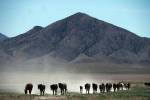The end of nuclear?
Nuclear radiation is dangerous. The current public health concerns growing out of the post-tsunami crisis involving four active nuclear reactors in Japan are serious and immediate.
That said, however, two full generations after the science fiction films of the 1950s gave us rampaging monsters born of the unseen horrors of nuclear fallout, our responses to nuclear accidents are still conditioned more by emotion than by rational analysis.
Calls have been widespread in the past two weeks that the accident involving Japan’s Fukushima reactors should “spell the end of nuclear power.”
Really? More than 400 peaceful nuclear power plants are now in operation around the world — 104 of them in the United States — supplying 20 percent or more of the energy needs of many nations, including ours. Replacing that power would mean mining and burning vastly more coal.
Around the world, coal mining accidents have taken many more lives over the years than nuclear accidents. Tens of thousands have had their lives shortened by coal-related respiratory diseases referred to as “black lung.” These costs are real and easily seen, whereas even in the “worst case” nuclear power accident to date, in 1986 at the Soviet reactor at Chernobyl, where the death toll may have risen into the thousands, alarmist reports that farmland for hundreds of miles around would be poisoned for centuries have turned out to be wildly overblown.
Nor has the public response even to non-nuclear accidents always been calm and measured. The recent blowout of a deep-sea BP oil drilling rig in the Gulf of Mexico showed safety standards were not adequately enforced, but the resulting dire warnings of “environmental catastrophe” were quickly replaced with reports of cleanup crews asking, “Where’s the oil?” The resulting political decision to place a moratorium on American-based drilling in the Gulf simply transferred those rigs and their activities to other locations around the world, exacerbating America’s shortage of domestically produced oil (and the jobs that come with it).
This is not the end of nuclear power. In fact, General Electric — which designed the Fukushima reactors 40 years ago — now asks why federal regulators are dragging their feet on approving plans for passive-cooled designs that could limit the damage from future accidents, by cooling and shutting down troubled cores through mere gravity flow, without requiring the aid of vulnerable diesel-electric pumps.
Take a casual attitude toward nuclear power, or a callous one toward power plant workers who risk their lives or their health? No. But nuclear power is no more likely to be banned than we are likely to give up eating deep-sea fish just because the job of a deep-sea fisherman is so hazardous.


















